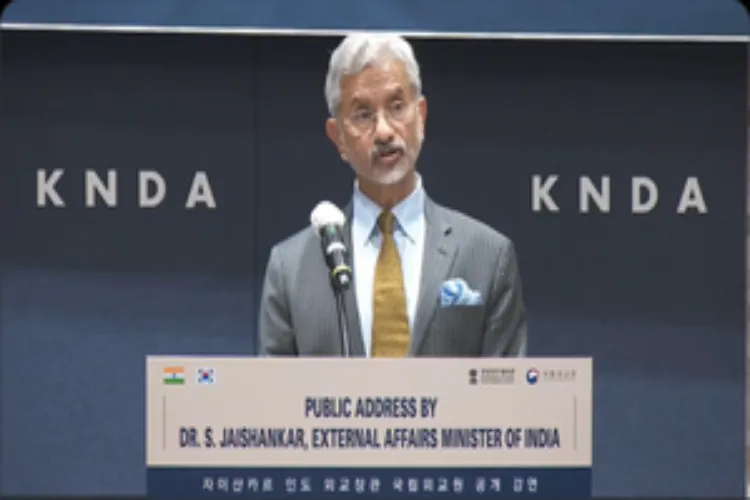
New Delhi
Exuding confidence that the India- Republic of Korea partnership can emerge as a significant factor in the Indo-Pacific, External Affairs Minister (EAM) S Jaishankar said on Tuesday that the two nations can "actively contribute" to the reshaping of the global order.
Speaking on ‘Broadening horizons: India-Korea Partnership in the Indo-Pacific’ at the Korea National Diplomatic Academy in Seoul, EAM Jaishankar said that the partnership between the two nations is acquiring a greater salience in a more uncertain and volatile world.
"As two significant G20 members, India and Republic of Korea have a growing responsibility to actively contribute to the reshaping of the global order. The era when a few powers exercised disproportionate influence over that process is now behind us... It has become a more collaborative and broad-based endeavour," the minister said.
Facing common challenges of terrorism and WMD proliferation that have impacted the national security of both nations, he said that working together has always been to our common advantage.
Stating that it is important to work more closely with like-minded partners in the Indo-Pacific, the minister said that India's stakes in terms of trade, investment, services, resources, logistics, and technology in the region are growing by the day.
"Ensuring the stability, safety, and security of this region is therefore vital for us. We have an obligation to the global commons, just as we have a duty to do global good," EAM Jaishankar, who is in Seoul to co-chair the 10th Joint Commission Meeting between the two countries on Wednesday, said.
The Republic of Korea released its Indo-Pacific Strategy in 2022, envisaging a free, peaceful, and prosperous region based on three principles of inclusiveness, trust, and reciprocity.
This, the minister said, creates the basis for working more closely with like-minded partners.
Underlining the importance of intensifying bilateral engagement across various spectrums, the minister stressed the need to have more political discussions and more strategic conversations.
Acknowledging that the two countries need stronger business connections and technology interactions, EAM Jaishankar said that the long-pending review of our CEPA (Comprehensive Economic Partnership Agreement) must be expedited so that it can be upgraded.
Negotiated over twelve rounds for more than three years, CEPA came into effect in January 2010 after being signed in 2009, to promote greater economic exchanges between the two countries.
The negotiations on the agreement are likely to conclude in 2024, according to South Korean envoy, Chang Jae-bok.
The EAM Jaishankar said that the growing efficiencies of India are on offer as an attraction to Korean businesses.
Recounting the growth prospects of India, he said: "We have rebounded robustly from the Covid period and are on track to become the third largest economy in the next few years. Along with that, if you look at the innovations underway, the start-up culture and the number of unicorns, there is a strong case here for greater focus and attention."
ALSO READ: Violinist Ustad Asghar Hussain’s unforgettable moments with PM Modi, Putin
"We will have to identify more intersections and meeting points that work for both of us. We will also have to be more collaborative, recognising the strengths that we each bring to the table," Jaishankar said.
